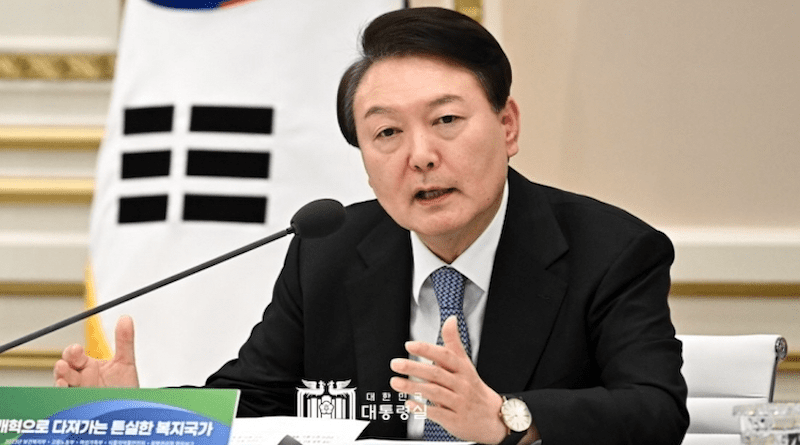South Korea’s Nuclear Turn: Propellers And Prospects – Analysis
By IPCS
By Dr. Sandip Kumar Mishra*
South Korean President Yoon Suk-yeol said on 11 January 2023 that if North Korea’s nuclear threats became out of control, his country could acquire its own nuclear weapons. He even said that given South Korea’s technological ability, becoming a nuclear power would not take long.
The statement drew attention because this was the first time in decades that an incumbent president had spoken about South Korea going nuclear. It is also contrary to Yoon’s own position so far. In a news conference on 17 August 2022, he said that “his government has no plans to pursue its own nuclear deterrent” in the face of growing North Korean nuclear threats. The US was quick to react to Yoon’s recent statement,saying that it didn’t support South Korea going nuclear as its goal was “comprehensive, verifiable, and irreversible denuclearisation” (CVID) of the Korean peninsula.
Notwithstanding the South Korean president’s remarks and the US response, it’s quite obvious that public opinion in South Korea has been shifting. In a survey conducted by the Chicago Council on Global Affairs in February 2022, around 71 per cent respondents were in favour of South Korea opting for its own nuclear weapons. Furthermore, in January 2023, as per a Gallup Korea poll commissioned by the Chey Institute for Advanced Studies, around 76.6 per cent South Koreans felt that the country needed to develop its own nuclear weapons. Such a substantial opinion would definitely have an impact on the country’s political leaders—including President Yoon Suk-yeol.
The shift in the South Korean public’s mood could be attributed to several factors. First, in recent times, North Korea’s missile tests and nuclear developments have become more frequent. Even though the previous South Korean administration tried to engage North Korea, including attempts to bring North Korea and the US to the negotiating table, Pyongyang’s belligerent behaviour hasn’t changed. This has led to public fatigue for the engagement policy. North Korea conducted almost 90 missile tests in 2022 and this has definitely affected South Korean popular opinion. Most recently, North Korean drones were identified in Seoul; they reached close to the security circle of the presidential residence. North Korea has abandoned almost every joint agreement of the Moon Jae-in era. They have demolished the Kaesong Inter-Korea Liaison Office; defied the Panmunjom Declaration; and directed bitter personal remarks towards South Korea and its leaders. Also, there is no sign that North Korea will join denuclearisation talks with the US. South Korean people thus think that their country going nuclear could be one of the ways to deal with North Korea.
Second, South Korea people have also become uncertain about the US commitment to South Korean security. During the Donald Trump administration, the US’ transactional approach led South Koreans to become sceptical about the country’s commitment to their security. Trump demanded an exclusive financial burden on Seoul for stationing American soldiers in South Korea and made unilateral moves in its dealings with North Korea (such as cancelling joint military exercises with South Korea). These have led South Koreans to consider the possibility of their own mechanism to defend themselves in case of a North Korean attack. Even now, during Joe Biden’s presidency, South Korea feels that the US has pressing priorities other than the Korean peninsula.
Third, South Koreans are also aware of changing global and regional dynamics. Some feel that the West is doing less than expected in the Ukraine crisis. South Korea is also aware that that global contestation between the US and Russia and the US and China has important implications for itself. In this changing scenario, unlike the South Korean leadership, the people feel that by seeking their own security through nuclear weapons, South Korea could minimise its security dependence on the US and create space for simultaneous economic interactions with China.
Thus, President Yoon Suk-yeol’s statement is not surprising given the shifting public mood in the country. It is however still not clear whether South Koreans are fully aware of the costs of pursuing nuclear weapons of their own. If Seoul decides to acquire nuclear weapons, it will have important implications for regional countries and their security postures. The South Korean public must be made more aware that any move towards nuclearisation would in a way constitute success for North Korea. Pyongyang seeks to augment its own nuclear capacity and provoke other regional actors—such as South Korea and Japan—to go nuclear so that the goal of denuclearising the Korean peninsula is dead forever.
Although the South Korean government has officially denied any present intent to develop nuclear weapons, its future course will test all the concerned stakeholders.
Dr. Sandip Kumar Mishra is Associate Professor, Centre for East Asian Studies, SIS, JNU, & Distinguished Fellow, IPCS.

